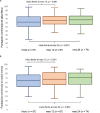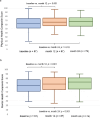Real-world effectiveness of fingolimod in patients with multiple sclerosis in Bulgaria
- PMID: 38018696
- PMCID: PMC10831698
- DOI: 10.33588/rn.77s04.2023213
Real-world effectiveness of fingolimod in patients with multiple sclerosis in Bulgaria
Abstract
Introduction: Fingolimod, a sphingosine-1-phosphate receptor agonist used for the treatment of multiple sclerosis (MS). Our goal was to assess the impact of fingolimod on quality of life in patients with relapsing-remitting multiple sclerosis (RRMS) after 2 years of treatment in this real-world study.
Patients and methods: This was a 2-year, prospective, observational study conducted in Bulgaria in RRMS patients treated with fingolimod. Quality of life was assessed using the Bulgarian-language version of the MSQoL-54 scale. The primary endpoint was the change from baseline in the MSQoL-54 score after 2 years of treatment. Secondary endpoints included the change from baseline in the MSQoL-54 score after one year of treatment, furthermore the assessment of depression level using the Hamilton D-17 score.
Results: A total of 87 eligible patients were included in the study with a mean age of 38.7 ± 8.45 years. The median Expanded Disability Status Scale (EDSS) score was 3.5 points. We found statistically significant improvement in 10 subscales at month 12 and in seven subscales at month 24. The mental health composite score increased from 64.0 ± 16.69 points to 67.5 ± 15.94 points at month 24 (p = 0.012). The physical health composite score increased from 61.7 ± 17.61 to 66.3 ± 16.70 (p = 0.001). Depression level measured by the HAM-D17 decreased significantly by month 12 and month 24. The EDSS score decreased or remained stable in more than half of the patients (61.6%). We detected better quality of life in patients with a lower EDSS score.
Conclusions: Quality of life scores and the depression level are improved in RRMS patients treated with fingolimod over 2 years in real-life setting.
Title: Eficacia en la vida real del fingolimod en pacientes con esclerosis múltiple en Bulgaria.
Introducción. El fingolimod es un agonista del receptor de esfingosina-1-fosfato utilizado para el tratamiento de la esclerosis múltiple (EM). Nuestro objetivo era evaluar los resultados del fingolimod en la calidad de vida de los pacientes con EM recurrente-remitente tras dos años de tratamiento en este estudio de la vida real. Pacientes y métodos. Se trata de un estudio observacional prospectivo de dos años de duración realizado en Bulgaria en pacientes con EM recurrente-remitente tratados con fingolimod. Se evaluó la calidad de vida mediante la versión en búlgaro de la escala Multiple Sclerosis Quality of Life-54 (MSQoL-54). El criterio de valoración principal fue el cambio respecto al valor inicial en la puntuación en la MSQoL-54 tras dos años de tratamiento. Los criterios de valoración secundarios fueron el cambio respecto al valor inicial en la puntuación en la MSQoL-54 tras un año de tratamiento, además de la evaluación del nivel de depresión mediante la puntuación de la escala de puntuación de la depresión de Hamilton (HAM-D17). Resultados. En el estudio se incluyó a 87 pacientes elegibles con una edad media de 38,7 ± 8,45 años. La mediana de la puntuación en la Expanded Disability Status Scale (EDSS) fue de 3,5 puntos. Se halló una mejora estadísticamente significativa en 10 subescalas en el mes 12 y en siete subescalas en el mes 24. La puntuación combinada de salud mental aumentó de 64 ± 16,69 puntos a 67,5 ± 15,94 puntos en el mes 24 (p = 0,012). La puntuación combinada de salud física aumentó de 61,7 ± 17,61 a 66,3 ± 16,7 (p = 0,001). El nivel de depresión medido por la HAM-D17 disminuyó considerablemente en el mes 12 y en el mes 24. La puntuación de la EDSS disminuyó o se mantuvo estable en más de la mitad de los pacientes (61,6%). Detectamos una mejor calidad de vida en los pacientes con una puntuación más baja en la EDSS. Conclusiones. Las puntuaciones de calidad de vida y el nivel de depresión mejoraron en los pacientes con EM recurrente-remitente tratados con fingolimod durante dos años en un entorno real.
Conflict of interest statement
Conflicto de intereses: Ninguno.
Figures
Similar articles
-
Effectiveness, safety and health-related quality of life of multiple sclerosis patients treated with fingolimod: results from a 12-month, real-world, observational PERFORMS study in the Middle East.BMC Neurol. 2017 Aug 7;17(1):150. doi: 10.1186/s12883-017-0913-3. BMC Neurol. 2017. PMID: 28784108 Free PMC article.
-
Real-world effectiveness and safety of fingolimod in patients with multiple sclerosis in the Czech Republic: results from core and extension parts of the GOLEMS study up to 48 months.BMC Neurol. 2022 Apr 15;22(1):143. doi: 10.1186/s12883-022-02656-8. BMC Neurol. 2022. PMID: 35428205 Free PMC article.
-
Comparative effectiveness and cost-effectiveness of natalizumab and fingolimod in rapidly evolving severe relapsing-remitting multiple sclerosis in the United Kingdom.J Med Econ. 2024 Jan-Dec;27(1):109-125. doi: 10.1080/13696998.2023.2293379. Epub 2023 Dec 26. J Med Econ. 2024. PMID: 38085684
-
Fingolimod for relapsing-remitting multiple sclerosis.Cochrane Database Syst Rev. 2016 Apr 19;4(4):CD009371. doi: 10.1002/14651858.CD009371.pub2. Cochrane Database Syst Rev. 2016. PMID: 27091121 Free PMC article. Review.
-
Systematic literature review and network meta-analysis in highly active relapsing-remitting multiple sclerosis and rapidly evolving severe multiple sclerosis.BMJ Open. 2017 Mar 10;7(3):e013430. doi: 10.1136/bmjopen-2016-013430. BMJ Open. 2017. PMID: 28283486 Free PMC article. Review.
Cited by
-
Therapeutic Potential of Fingolimod on Psychological Symptoms and Cognitive Function in Neuropsychiatric and Neurological Disorders.Neurochem Res. 2024 Oct;49(10):2668-2681. doi: 10.1007/s11064-024-04199-5. Epub 2024 Jun 26. Neurochem Res. 2024. PMID: 38918332 Review.
References
-
- Kobelt G, Pugliatti M. Cost of multiple sclerosis in Europe. Eur J Neurol. 2005;12(Suppl 1):S63–7. - PubMed
-
- Pugliatti M, Rosati G, Carton H, Riise T, Drulovic J, Vécsei L, et al. The epidemiology of multiple sclerosis in Europe. Eur J Neurol. 2006;13:700–22. - PubMed
-
- Milanov I. National consensus for diagnosis and treatment of multiple sclerosis. Movement Disorders Bulgaria. 2021;18(Suppl.1):S1–64.
-
- Keegan BM, Noseworthy JH. Multiple sclerosis. Annu Rev Med. 2002;53:285–302. - PubMed
-
- Rudick RA, Miller DM. Health-related quality of life in multiple sclerosis:current evidence, measurement and effects of disease severity and treatment. CNS Drugs. 2008;22:827–39. - PubMed
Publication types
MeSH terms
Substances
Grants and funding
LinkOut - more resources
Full Text Sources
Medical





